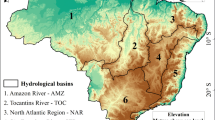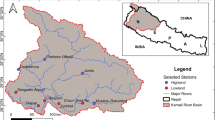Abstract
The assessments of observed, attributed, and projected changes in extremes in two recent reports, the Intergovernmental Panel (IPCC) on Climate Change Fourth Assessment of Climate Change (AR4) and the IPCC Special Report on Managing the Risks of Extreme Events and Disasters to Advance Climate Change Adaptation (SREX) are compared. This comparison focuses on global-scale changes in extremes as summarized in two “summary” tables from the AR4 and SREX, respectively. Many of the compared SREX and AR4 assessments of changes in extremes are essentially identical or in partial agreement, once the different language and different approaches to estimating uncertainty are taken into account. Two main exceptions are tropical cyclones and droughts. In the case of tropical cyclones, a less confident SREX assessment of past changes reflects post-AR4 studies that have improved our understanding of “the uncertainties in the historical tropical cyclone records, the incomplete understanding of the physical mechanisms linking tropical cyclone metrics to climate change, and the degree of tropical cyclone variability”. In the case of droughts, “(d)efinitional issues and lack of data…plus the inability of models to include all the factors likely to influence droughts” have led to overall weaker SREX assessments than was the case in AR4, both for observed and projected changes, although differences in the statements being assessed also explain some of the differences. Increased consistency of approach between assessments would simplify future attempts to compare the assessed uncertainties associated with changes in extremes, although changes in the wording of such assessments also needs to be considered. For instance, some aspects of the SREX assessments were the consequence of the revised IPCC uncertainty guidance, which was prepared mid-way through the SREX process.

Similar content being viewed by others
References
Alexander LV, Zhang X, Peterson TC, Caesar J, Gleason B, Klein Tank AMG, Haylock M, Collins D, Trewin B, Rahimzadeh F, Tagipour A, Kumar KR, Revadekar J, Griffiths G, Vincent L, Stephenson DB, Burn J, Aguilar E, Brunet M, Taylor M, New M, Zhai P, Rusticucci M, Vazquez-Aguirre JL (2006) Global observed changes in daily climate extremes of temperature and precipitation. J Geophys Res-Atmos 111:D05109
Bates BC, Kundzewicz ZW, Wu S, Palutikof JP (2008) Climate change and water. Technical paper of the intergovernmental panel on climate change. IPCC Secretariat, Geneva, 210 pp
Burke EJ, Brown SJ (2008) Evaluating uncertainties in the projection of future drought. J Hydrometeorol 9(2):292–299
Dai AG, Trenberth KE, Qian TT (2004) A global dataset of palmer drought severity index for 1870–2002: relationship with soil moisture and effects of surface warming. J Hydrometeorol 5(6):1117–1130
IPCC (2007) In: Solomon S, Qin D, Manning M, Chen Z, Marquis M, Averyt KB, Tignor M, Miller HL (eds) Climate change 2007: the physical science basis. Contribution of working group I to the fourth assessment report of the intergovernmental panel on climate change. Cambridge University Press, Cambridge
IPCC (2012) Summary for policymakers. In: Field CB, Barros V, Stocker TF, Qin D, Dokken DJ, Ebi KL, Mastrandrea MD, Mach KJ, Plattner G-K, Allen SK, Tignor M, Midgley PM (eds) Managing the risks of extreme events and disasters to advance climate change adaptation. Cambridge University Press, Cambridge, pp 3–21, A Special Report of Working Groups I and II of the Intergovernmental Panel on Climate Change
InterAcademy Council (2010) Review of the processes and procedures of the IPCC. Available from: http://reviewipcc.interacademycouncil.net/report.html
Knutson TR, McBride JL, Chan J, Emanuel K, Holland G, Landsea C, Held I, Kossin JP, Srivastava AK, Sugi M (2010) Tropical cyclones and climate change. Nat Geosci 3(3):157–163
Mastrandrea MD, Field CB, Stocker TF, Edenhofer O, Ebi KL, Frame DJ, Held H, Kriegler E, Mach KJ, Matschoss PR, Plattner G-K, Yohe GW, Zwiers FW (2010) Guidance note for lead authors of the IPCC fifth assessment report on consistent treatment of uncertainties. Intergovernmental Panel on Climate Change (IPCC). Available at (http://www.ipcc.ch)
Seneviratne SI, Nicholls N, Easterling D, Goodess CM, Kanae S, Kossin J, Luo Y, Marengo J, McInnes K, Rahimi M, Reichstein M, Sorteberg A, Vera C, Zhang X (2012) Changes in climate extremes and their impacts on the natural physical environment. In: Field CB, Barros V, Stocker TF, Qin D, Dokken DJ, Ebi KL, Mastrandrea MD, Mach KJ, Plattner G-K, Allen SK, Tignor M, Midgley PM (eds) Managing the risks of extreme events and disasters to advance climate change adaptation. Cambridge University Press, Cambridge, pp 109–230, A Special Report of Working Groups I and II of the Intergovernmental Panel on Climate Change (IPCC)
Sheffield J, Wood EF (2008) Global trends and variability in soil moisture and drought characteristics, 1950–2000, from observation-driven simulations of the terrestrial hydrologic cycle. J Clim 21(3):432–458
Sheffield J, Wood EF, Roderick ML (2012) Little change in global drought over the past 60 years. Nature 491:435–438
Solomon S, Qin D, Manning M, Alley RB, Berntsen T, Bindoff NL, Chen Z, Chidthaisong A, Gregory JM, Hegerl GC, Heimann M, Hewitson B, Hoskins BJ, Joos F, Jouzel J, Kattsov V, Lohmann U, Matsuno T, Molina M, Nicholls N, Overpeck J, Raga G, Ramaswamy V, Ren J, Rusticucci M, Somerville R, Stocker TF, Whetton P, Wood RA, Wratt D (2007) Technical summary. In: Solomon S, Qin D, Manning M, Chen Z, Marquis M, Averyt KB, Tignor M, Miller HL (eds) Climate change 2007: the physical science basis. Contribution of working group I to the fourth assessment report of the intergovernmental panel on climate change. Cambridge University Press, Cambridge
Villarini G, Vecchi G (2013) Projected increases in North Atlantic tropical cyclone intensity from CMIP5 Models. J Climate 26:3231–3240
Webster PJ, Holland GJ, Curry JA, Chang H-R (2005) Changes in tropical cyclone number, duration, and intensity in a warming environment. Science 309:1844–1846
Acknowledgments
The Lead Authors of the SREX Chapter 3 (David Easterling, Clare M. Goodess, Shinjiro Kanae, James Kossin, Yali Luo, Jose Marengo, Kathleen McInnes, Mohammad Rahimi, Markus Reichstein, Asgeir Sorteberg, Carolina Vera, Xuebin Zhang) contributed much time and effort in the preparation of the SREX Chapter 3 assessments, although the comparison in this current article reflects the views of N. Nicholls and S.I. Seneviratne only. N. Nicholls’s contribution to this article was supported by the Australian Research Council through Discovery Project DP0877417.
Author information
Authors and Affiliations
Corresponding author
Additional information
This article is part of a Special Issue on “Advancing Climate Change Adaptation and Risk Management” edited by Joern Birkmann and Reinhard Mechler.
Rights and permissions
About this article
Cite this article
Nicholls, N., Seneviratne, S.I. Comparing IPCC assessments: how do the AR4 and SREX assessments of changes in extremes differ?. Climatic Change 133, 7–21 (2015). https://doi.org/10.1007/s10584-013-0818-0
Received:
Accepted:
Published:
Issue Date:
DOI: https://doi.org/10.1007/s10584-013-0818-0




